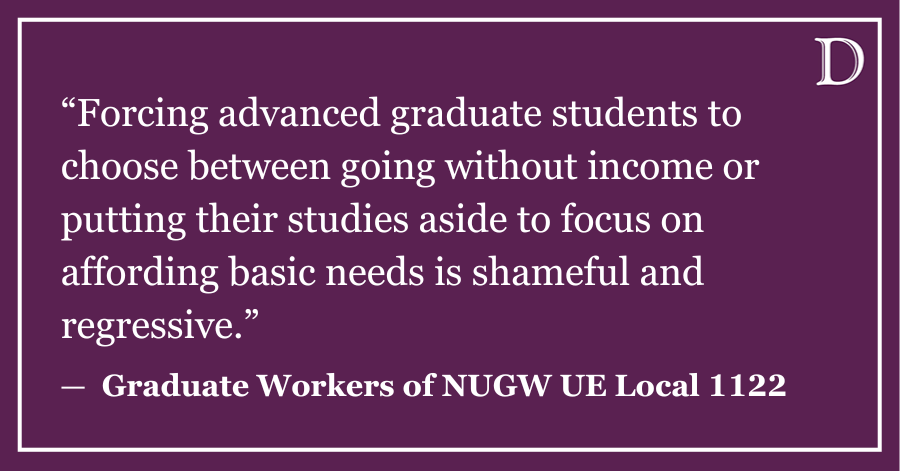As the national anthem plays prior to each NU sporting event, I often find that my voice is a lonely one.
Students around me sometimes look over in surprise and struggle to contain their laughter as I sing “The Star-Spangled Banner,” throwing me off my rhythm. This is entirely understandable.
America’s relationship with our national anthem is a unique one. The anthem is sung nightly at sporting events across the country, most of which involve two teams based in the United States. Yet, the ritual rarely includes spectator participation, as the microphone is typically handed to a recording artist or a talented local teen to put their own spin on the song. The average citizen is asked simply to remove their cap and face the flag.
Today, the national anthem is a lightning rod for political controversy. Ever since former NFL quarterback Colin Kaepernick quietly took a knee before a 2016 preseason game, behavior during the national anthem has become a litmus test for which side one takes in a culture war. While I do not intend to weigh in firmly on one one side of this particular debate, its contours reveal quite a lot about how most Americans view the anthem.
Those who are disgusted by Kaepernick and his disciples often use refrains such as “respect the flag” or “respect our troops,” suggesting that they view the anthem as an exercise in reverence in which citizens should show an almost religious devotion to their country.
Many who choose to protest the anthem cite America’s failures to include Black Americans in its promise of prosperity, particularly in light of recent incidents of police brutality. Implicit in this argument is the belief that participating in the national anthem routine would be excessively nationalistic, constituting a ringing endorsement of America as it is.
While the two sides of the national anthem debate are fundamentally at odds ideologically, they agree on the anthem’s central purpose as a method of expressing unwavering patriotic fealty. I reject this premise.
When I sing the national anthem, it is not because I believe America to be a perfect nation, or even a nation free of deep-rooted flaws. I sing because I believe a better America can only be built by those who feel an attachment to their fellow citizens and to the founding promise of our country.
What the standing/kneeling controversy misses is that a national anthem can play a role beyond conveying “respect” for one’s flag and military. It can also help to establish camaraderie among a group of people who might otherwise be strangers or even enemies.
From my years of following international soccer, I have come to believe that our anthem culture could be vastly improved upon. Before each match contested among national teams, both sets of players line up to sing their respective national anthems and are joined in full voice by thousands of passionate fans.
The defining images of pre-match anthems at World Cups tend to be those of players and fans alike bursting into tears as they strain every sinew belting out their country’s anthem. These are people from all walks of life, arm-in-arm with their fellow countrymen and countrywomen, united in song to celebrate what binds them together.
The scenes of Welsh fans serenading their country as they played their first ever World Cup in 2022 never fail to send chills rushing through my body. Moments like this are still stirringly patriotic, but in a manner that emphasizes the collective spirit of the people who make up a nation.
For Wales, a country with just over three million people and a relatively homogenous population, the unity on display within the crowd is believable. The United States, meanwhile, has a population that is over 100 times larger and comprised of people that have little to nothing in common other than citizenship.
It is for precisely this reason that I believe singing “The Star-Spangled Banner” to be a worthy cause. In a time of deep division, it is a small step we can all take to feel connected to our fellow citizens of all backgrounds.
If the lyrics don’t resonate with you or the context in which it was written gives you pause, I understand. May I venture, however, that the significance of almost every country’s national anthem has become divorced from its lyrics and original context.
For example, France’s classic “La Marseillaise” includes a lyric that roughly translates to, “may impure blood water our fields.” Yet, while the French public embraces this revolutionary battlecry in a wide variety of contexts, no one in their right mind espouses its literal meaning.
Although the lyrics are largely irrelevant, national anthems create a pretext for a large group of people to sing in unison. There are few activities more uplifting to the human spirit than bursting into song alongside thousands of strangers. It is the prospect of droves of Americans united in a single action — and a beautiful, musical one — that makes the idea of a universally-sung anthem so captivating to me.
I am not demanding anyone conform to my personal choice. I fully support the First Amendment rights of those who protest the anthem; their speech is just as grounded in American values as my own. However, my hope is that in reading this, others might be inspired to join me in song — thinking of our anthem not as a pledge of blind loyalty, but as a shared act of hope for a brighter future.
Eli Kronenberg is a Medill freshman. He can be contacted at [email protected]. If you would like to respond publicly to this op-ed, send a Letter to the Editor to [email protected]. The views expressed in this piece do not necessarily reflect the views of all staff members of The Daily Northwestern.













